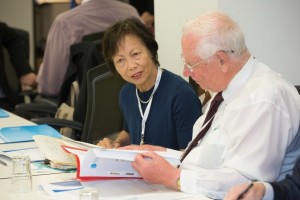Roundtable talks encourage religious education
A new initiative has been proposed to improve religious literacy to ensure religious freedom is appropriately considered in legislative and regulatory reform.
Religious freedom advocates plan to take action to increase education on religion within government and the public service in order to have religious sensitivity considered and rights upheld in governmental processes.
The initiative came about during discussions at the inaugural Religious Freedom Roundtable held in November.
The Roundtable provided a forum for constructive, respectful and trust-based dialogue with 25 religious and non-faith organisations.
Australia’s Human Rights Commissioner Tim Wilson presented a summary of the Roundtable discussions and initiatives proposed.
“The Religious Freedom Roundtable provided an opportunity for religious and non-faith organisations to reassert the importance of religious freedom as part of the nation’s human rights discussion,” said Commissioner Wilson.
One of the actions proposed to raise religious literacy was to create a visitor program for schools to educate students about different faith traditions and those without religious belief.
Enabling education on religious and non-religious belief will ensure that public and government organisations are encouraged to ensure that rights and freedoms of all are advanced.
A long-term discussion with all affected stakeholders about how to advance these rights, including preserving religious freedom in anti-discrimination law, will focus on the common ground between differing perspectives.
“The Roundtable was not convened to legitimise a reform program, rather to start a long-term, national conversation about religious freedom,” said Commissioner Wilson.
A range of issues were touched on during the discussions, with each issue considered of merit given an initiative or action in order to explore it further within individual organisations and throughout public forums.
An open-mindedness of all parties involved was key to making progress on issues of inclusiveness.
An opt-in model approach may be implemented to coordinate and discuss reform proposals that would allow for civil marriage for same-sex couples and the preservation of religious liberty and universal values as an umbrella under which all faiths and non-faiths can abide.
Another initiative proposed was to develop a model of self-regulation for religious institutions that receive taxpayer’s funding for the provision of public services.
Overall though, the issues covered during the discussions are ultimately reliant on the organisations involved to implement themselves.
“Participating organisations have been invited to consider the merit and commitment of advancing these proposed initiatives with their representative bodies. Advancing these initiatives will be voluntary,” said Commissioner Wilson.
Future meetings of the Roundtable will also aim to consider the perspectives of many minorities, including atheists and the LGBTQI community, as well as consider issues regarding the rights of children and the spirituality of Aboriginal and Torres Strait Islander peoples.
Ruby Brown
AMES Australia Staff Writer













